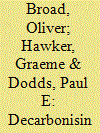| Srl | Item |
| 1 |
ID:
176722


|
|
|
|
|
| Summary/Abstract |
The UK has some of the worst performing residential buildings in the EU from an energy efficiency perspective. Natural gas remains a dominant feature of existing and new-build housing with strong historical, technical, and social barriers to change. Consequently, the residential sector is responsible for significant shares of national emissions and has a strong role to play under ambitious net zero targets.
|
|
|
|
|
|
|
|
|
|
|
|
|
|
|
|
| 2 |
ID:
090958


|
|
|
|
|
| Publication |
2009.
|
| Summary/Abstract |
The challenge of orchestrating coordination and cooperation among the many international organizations active in international development has attracted much interest from academics and practitioners alike. This study addresses a particular piece of the larger puzzle: as nongovernmental organizations (NGOs) and their donors, each usually with much different policy orientations, coalesce within interorganizational networks, what determines whose policy preferences are pursued, implemented, and delivered on the ground? Within the network-based model of NGO behavior introduced in this article, certain attributes and the internal institutional composition of NGO-donor policy networks are significant determinants in shaping opportunities for NGOs and in giving both NGOs and donors leverage over the policy process. The model focuses specifically on demonstrating the effects of a network on NGO autonomy-that is, an NGO's ability to advance its own policy preferences regardless of their congruency with those of its donors. The network typology presented in this study identifies the comparative advantages of distinct network types in which the NGO is most empowered as an autonomous policy actor and is best equipped to withstand parochial donor preferences. Using network analysis and the proposed network-based model, this research takes the form of a comparative study of four NGO-donor policy networks from the postconflict microfinance sector in Bosnia and Herzegovina. The study also charts new research paths toward developing network-based approaches to the study of international institutions.
|
|
|
|
|
|
|
|
|
|
|
|
|
|
|
|